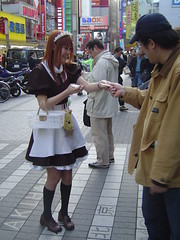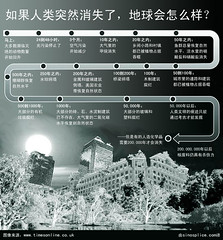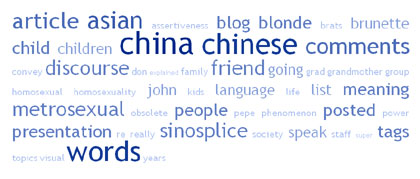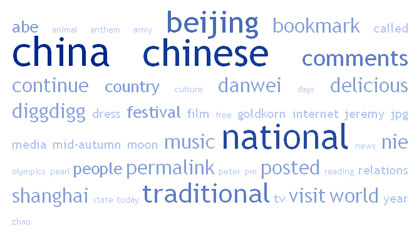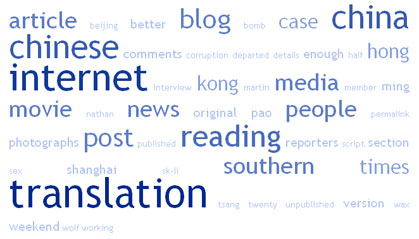10
Nov 2006Medicine Ingredients = Pun Ingredients
Ever since I started doing my Chinese pun posts, I’ve been deluged with requests for more*. So today I am finally getting around to posting one that I’ve been seeing for something like a year in an ad on the subway:
> 药材好,药才好。
> Only good ingredients can make good medicine.
The pun is with the words 药 (medicine), 才 (an adverb meaning something like “only if”), and 药材 (medicinal ingredients). You have two three-character phrases with exactly the same character pronunciation, but the difference of one character in the two phrases (材 and 才, both read “cái”) gives the sentence clear meaning.
The two parts can’t be said to be entirely identical, because read naturally, there would definitely be different pauses in the first part and the second part. Still, the identical pronunciations still make it kind of charming.
* This is a total lie.
UPDATE: John B has provided a picture of the ad. Thanks, John B!
Related:
08
Nov 2006A New Advertising Low?
There are so many ads for cosmetic surgery in Shanghai taxis these days. Ken reports this grim discovery:
> Now, it can be annoying when you’re sitting in a taxi and you cannot turn off the TV screen 18 inches from your face, but I can live with it. However, what I saw in the taxi today today was perhaps a new low. There was a print ad, mounted on the back of the head rest in front of me, advertising a plastic surgery clinic that obviously churns out operations. Part of the ad was a reflective plastic thing (it looked like tin foil) in the shape of a mirror that invited you to look into it and consider if you didn’t need to do something about your looks. (I answered in the affirmative.)
> So there you are stuck in traffic, on a Monday morning for an hour and all you see is your own, crumpled, ugly mug looking back at you with, a doctor holding a scalpel smiling at you. (I wept profusely.) I almost told the taxi driver to head over to the clinic and get it done before lunch.
Yikes.
06
Nov 2006Busty Models Get Men Thinking… about what now?
If you’ve ever seen a “men’s magazine” like FHM or Maxim, you know that one of the main staples is “interviews” with buxom young females. In these multi-page features photographs figure prominently, words are squeezed in at the sides, and key quotations are carefully selected and displayed in big type next to the photographs. These quotations are usually sex-related, designed to get the reader’s pulse racing. (If you really need examples of this, you might try taking a look at NSFW-1 or NSFW-2.)
I haven’t really taken a look at the Chinese equivalents of these magazines, but I recently chanced upon the following picture of Chinese model 陈馨婷 (Chén Xīntíng):
The quote says:
> 我很期待穿婚纱的感觉。 (Wǒ hěn qīdài chuān hūnshā de gǎnjué.)
which might be (a bit awkwardly) translated as:
> I’m really looking forward to the feeling of wearing a wedding dress.
That funny feeling you’re left with is a special brand of men’s magazine culture shock. Maybe.
04
Nov 2006Business and Buddies in Beijing
Last Tuesday and Wednesday I was in Beijing on ChinesePod business. I can’t really talk about that, but hopefully our reasons for being there will all be public by the end of the month. This trip was significant for other reasons, though — I got to (briefly) experience Beijing as a non-tourist for once, and to finally meet some guys I’ve been communicated with over the internet for years (that’s hard to believe) without ever meeting.
The last time I was in Beijing was 2001. I visited twice that summer, once with my friend Ari as part of a big long trip, and the other time with my little sister. It had been 5 years since I saw it last, and with all the preparations for the Olympics, I was looking forward to seeing all the changes. I didn’t get to see any, though. My last visit to Beijing had been as a tourist, and this time I didn’t go to any of those same places. Geographically, the visits didn’t overlap a single bit. Even points of arrival and departure were different; this was my first time flying to and from Beijing. So without any physical overlap, I couldn’t really compare from a chronological perspective at all.
My impressions of Beijing were very good this time, though. The weather was great, and the areas of Beijing I spent time in were all pleasant. I think what impressed me most, though, was the laid back feel of the city. I know that Shanghai is extremely fast-paced and business-oriented, but perhaps I had thought Beijing was too, at least to a greater degree. To me, Beijing felt more comparable to Hangzhou in that respect. In Hangzhou, people go to West Lake to just sit around and play cards all day long. That kind of thing just doesn’t happen in Shanghai.
I met up with Roddy (Chinese Forums, Signese) first, and a little later Joel (Danwei) joined us at a cafe/bar on Houhai. Brendan (Bokane.org) organized a get-together at a bar called Sandglass (a very predictable selection, according to Roddy). There I met David (AdsoTrans) and Jeremy (Danwei, Danwei TV).
It’s always interesting to meet in person the people you only know through online communication. There were some differences between my expectations of these guys and what I actually experienced.
Roddy Flagg (Chinese Forums, Signese)
I have chatted with Roddy a lot over the years, and we’ve helped each other out with online projects more than once. I was already familiar with his sense of humor. Although I didn’t know exactly what he looked like before I met him, there weren’t any surprises there.
Joel Martinsen (Danwei)
Joel has been an extremely helpful commenter on Sinosplice over the years, and has helped me out with various translation issues. As any reader of Danwei knows, the man is an impressive translation powerhouse, and he’s an all around good guy as well. (He even bought me an ice cream.) No real surprises here.
Brendan O’Kane (Bokane.org)
I had actually met Brendan once before in Shanghai, but that time was brief and alcohol tinged. This time I got a better feel for the guy, and I think he’s pretty much exactly like his online persona with one big exception: he’s more cheerful in person.
David Lancashire (AdsoTrans)
What does one expect of a computational linguist who developed a free, impressive online machine translation system? A quiet, geeky guy, that’s what. I had chatted with David over IM multiple times, but I guess I didn’t get a good feel for his personality. In person he was funny and outgoing and didn’t look at all like what I expected. Also, he’s Canadian!
Jeremy Goldkorn (Danwei, Danwei TV)
I have a lot of respect for Jeremy, but somehow I got the impression of a rather formal, business-like person. Was I unfairly stereotyping budding media moguls? Anyway, Jeremy turned out to be a really funny, gregarious guy. It was really good of him to stop by after just getting back from a blogger conference in Hangzhou. I imagine he is quite bloggered out now.
Hopefully I’ll be making trips to Beijing more often in the future. Shanghai is the place for me for the foreseeable future, but Beijing is definitely a place I’d like to spend more time.
02
Nov 2006The Hug Threat
News from Beijing: Police stop people from offering free hugs.
Man, I was just in Beijing Tuesday and Wednesday, so missed out on the free physical affection and its fallout. What I didn’t miss is the sociopolitical and cultural implications, thanks to Greg’s brilliant editorial on the incident: China Says “No” to Half-assed Attempt at Affection.
More on Beijing next post.
31
Oct 2006The 'Please speak Mandarin' T-shirt
Some of you may have noticed that when I put up my new Tone Pair Drills I added a new Products section to this website along with it. I’ll introduce one of the items here from various fascinating sociopolitical angles.
The shirt says 请讲普通话 which means “please speak Mandarin” (rather than some other local dialect). The inspiration for this shirt can be seen at countless bus stops all over Shanghai: completely ineffectual “请讲普通话” propaganda. The Shanghainese continue blissfully barking at each other in their dialect regardless.
Simply by wearing this one shirt, you can:
– subtly poke fun of the PRC’s language policies
– inform Chinese people around you that you want to talk to them in Chinese
– inform Chinese people around you that you don’t want to engage them in whatever crazy dialect they speak (especially useful in Shanghai)
But I also created this shirt for another special reason. My roommate Lenny plans to move to Taiwan in December. He has made it clear on several occasions that he won’t put up for the degenerate dialect of Mandarin the Taiwanese call 国语, and he has made it his personal mission to reform the speaking habits of the whole island.
While I’m sure he will have no problem at all with that task (maybe he can even get Prince Roy to help, although Mark and Poagao may be thorns in his side), I thought he could use this shirt to aid his righteous crusade in some small way. The shirt is great for Taiwan because:
– The Taiwanese never say 普通话 (Mandarin), as that’s a politicized PRC word; they say 国语 (also Mandarin).
– Three out of five of the characters on the shirt are simplified. Simplified characters are, of course, an aesthetic affront to the Taiwanese which offends every fiber of their being.
Obviously there are many reasons why you need to order this shirt now. (Oh yeah, also: I ordered some merchandise before deciding to go with CafePress, and I can confirm that the quality of their stuff doesn’t suck anymore.) For more Sinosplice merchandise, check out the Sinosplice Store (more stuff to come soon).
29
Oct 2006New Feature: Mandarin Chinese Tone Pair Drills
It’s been a while since I’ve added significant non-blog content to Sinosplice, but I’ve just completed something that could be really useful to learners of Mandarin Chinese. That something is Mandarin Chinese Tone Pair Drills.
I actually began this project all the way back in 2003. I put my ideas together into a rough form and some friends (including John B, Brendan, Greg, and Alf) helped me test them out. They gave me good positive feedback, but I felt the whole thing still needed a fair amount of work. I didn’t find the time and inspiration to finally put in that necessary work until this month, almost three years later. I spent a good chunk of my October holiday working on it, and quite a few nights over the past few weeks.
The main idea behind these drills is that learning tones of individual characters is not enough. Learning tone combinations is the key. Mastering those combinations necessarily involves extensive practice with tone pairs. A mastery of tone pairs will lead to significant progress with any number and combination of tones in succession. Although I was not fully cognizant of the exact process at the time, I believe it was this method which lead to my own successes in correctly producing tones of Mandarin Chinese in succession.
This concept is not exactly unique. In the past few years I have even noticed several other websites take the “tone pair” angle. I think where the other websites fall short is:
1. The words chosen are random words, both in terms of part of speech as well as level of difficulty.
2. There is no clear method for how to use the tone pairs to improve one’s tones.
3. There is no clear connection between the tone pairs and actual speech.
4. They often rely too heavily on visuals (tone marks) to teach the tone combinations.
I tackled these problems in several ways.
1. I focused on adjectives, which are both highly likely to be useful in elementary conversation, as well as plentiful in almost all tone combinations at the elementary level.
2. I developed a clear method which progressively increases in difficulty, and, in the later stages of the method, can also be used by intermediate learners looking to improve their tones. (That method is provided in pinyin, simplified characters, and traditional characters.)
3. Following the method progressively will eventually result in practicing useful, grammatical sentences.
4. I included audio files for all the words in the drill, both in simple clickable online versions, as well as in downloadable MP3 versions with playlists for drilling and quizzing.
I also licensed the method using a Creative Commons license, encouraging others to build on it.
The method I developed is labeled as a “drill.” As such, there is definitely plenty of room for it to be built on using a Chinese teacher’s experience and a little creativity. I should also stress that the drill was designed to be practiced with a native speaker Chinese tutor, but I still believe it can be useful even without the guidance of a tutor.
I welcome your feedback. I do expect to update and improve this feature over time.
28
Oct 2006Korean from a Chinese Textbook
As I explained before, my wife and I are learning Korean here in Shanghai. Progress has been slow, though, because our tutor unexpectedly had to return to Korea for the summer. Dedicated students that we are, we seized the opportunity for a two-month break from our studies. She’s back now, though, so we’re back in the saddle. We all decided we needed a good textbook.
We textbook we decided on with our tutor is 新韩国语基础教程(上) (New Korean Foundation Course – Part 1 of 2), published by 大连理工大学出版社 (Dalian University of Technology Press). It may not be perfect or even particularly enlightened, but compared to the cornucopia of crap with which it shared space on the book store shelves, it seems like a Godsend.
The reasons I like the text are:
1. Chapter 1 of the textbook eases into the sounds and writing system of the language with extensive explanations of the simple vowels, then simple consonants, then diphthongs, then finals, then rules of pronunciation. That’s 32 pages! There are explanations (in Chinese) with IPA, examples, exercises, illustrations of the mouth, etc. There’s even a diagram showing exactly how the Korean writing system was designed to resemble the human mouth as it makes the sounds of the language (which is something I’d been curious about for a while). I complained last time about spending too much time on writing and pronunciation before learning any useful language and I still stand by that, but that doesn’t mean I don’t appreciate a very complete reference in Chapter 1 that I can come back to any time.
2. The regular chapters are broken down into pretty standard sections: (1) sentence patterns, (2) sample sentences, (3) dialogue, (4) new vocabulary, (5) Chinese translations of parts 1-3, (6) grammar explanations, (7) exercises. Nothing ground-breaking here, but it’s all very usable and practical. The grammar explanations are clear, with helpful charts and diagrams. I haven’t really spent much time on the exercises yet, so I won’t say anything about that.
3. I like how outside of Chapter 1 there is no romanization of the Korean anywhere, and the Chinese translation is on another page. This forces the beginner to trudge through the Hangul, which is a necessary ordeal.
The big disadvantage of the series is that all the listening exercises are meant to be accompanied by cassette tapes. I guess that can be forgiven since the series was published in 1999, but that doesn’t change the fact that tapes are useless to me now because I own nothing that plays them (and I’m not buying a stupid tape player).
Anyway, if you’re looking for a textbook for learning Korean in China, I think that 新韩国语基础教程 is a pretty good way to go. The two book set cost 48 RMB altogether (without the tapes).
26
Oct 2006Thank you, Andy Lau
Thank you, Andy Lau (刘德华), for one of the funniest Chinese music videos I have ever seen. Greg and I witnessed this amazing recording of a live concert while lunching at the “Kowloon Ice House” in Zhongshan Park’s “Cloud Nine” (龙之梦) mall. A search on YouTube turned up nothing, but thankfully the Tudou.com results had a clip of the exact video we watched:
For those of you too lazy or too foolish to watch that clip, let me recap the hilarity contained therein:
1. Andy Lau is wearing a white cowboy hat and a wifebeater-blouse.
2. The song is a Cantonese version of “I Hate Myself for Loving You” called 我恨我痴心 (literally, “I Hate My Infatuation”).
Well, that’s all, really. It’s funny.
Oh, and just in case you need it, there’s also a karaoke version of 我恨我痴心 set to random boy/girl scenes that have absolutely nothing to do with the song.
22
Oct 2006Metrosexual: 9 Chinese Translations
When I mentioned a presentation on homosexuals in the West for my critical discourse analysis class, I gave the Chinese translation of “metrosexual” as 都市玉男. That’s not the only translation, though. In his research, Pepe turned up quite a few other translations currently in use online. Here are the ones Pepe collected, along with their literal meanings:
“Metrosexual”
1. 都市玉男 city jade man
2. 都市美型男 city beauty type man
3. 都市中性美男 city neuter beauty man
4. 都会美直男 city beauty straight man
5. 都市生活自恋者 city life narcissist
6. 花样美男 variety beauty man
7. 花色美男 variety beauty man
8. 雌性男人 female man
9. 后雅痞 post yuppie
Translation Notes
1. 都市 means both “city” and “metropolis,” as does 都会.
2. 美 could also be translated “beautiful” in all instances above
3. The same word “variety” was used for both 花样 and 花色, even though they’re different words. When examined at the character level, both contain the “flower” character, but the latter also contains 色, which in other words can mean “color” or something close to “sex.” I’m not sure exactly how the use of these words impact the feel of the Chinese translation.
Translation into Chinese can be pretty tough. I do find it very interesting to see the variety of translation attempts when a new, diffult to translate English word appears in Chinese media. Usually a certain period of time is required while society settles on one or two, effectively pushing out the rest, which are then are mostly forgotten by society.
After several years of hype, the whole metrosexual fad seems to be dying, and the English word might just die with it. If it does fall out of usage, though, that doesn’t necessarily mean its corresponding Chinese translation will. The Chinese might decide to keep the word around for their own purposes. Time will tell.
20
Oct 2006China, More Tissues (please)
When I went to Japan in 1997 to study for a year, it was my first time out of the United States. I knew Japan would be different, but I had very few expectations. I went out there with a year’s worth of Japanese, eyes wide open, and a brain ready to soak it all up. Of the many, many cultural peculiarities I noticed in Japan, one of the most convenient was the tissue pack advertising.
It’s a simple method. Someone goes to a crowded metropolitan area with a box of small packs of tissues. On the tissue packs’ plastic wrappers is advertising. People are quite often willing to accept free tissues, and happily carry the advertising with them wherever they go. Everyone wins.
When I first arrived in China, I discovered how important tissues are here. You use them as napkins, you use them as paper towels, you use them as toilet paper. You really shouldn’t go anywhere without a small personal tissue supply. I found myself really wishing that the Chinese would adopt the tissue pack advertising method.
Here in Shanghai the primary method of street advertising is handing out business card-sized ads in and around the subway stations. I imagine it doesn’t work well at all. The workers handing out the cards are extremely annoying, and no one wants the cards. Subway sanitation workers are always sweeping them up. It seems like the tissue pack advertising method would be perfect for China.
I have actually seen the method used here in Shanghai at least twice. I got a free pack of ad-swaddled tissues outside of the South Huangpi Road (黄陂南路) subway station just last week, and I saw it once before, a long time ago. This really needs to catch on.
Related:
– Tissue Issues (Sinosplice)
– examples of Japanese tissue packs (Flickr)
18
Oct 2006Some t-shirts I've seen lately
These were all spotted on t-shirts on the streets of Shanghai:
– Labial
– Herpes Club
– Naturally Two-Two
– Tomorrow is Peace. Tomorrow is Yesterday.
I have no explanation for the first two, although to be fair, “labial” is a legitimate linguistics term, and “herpes clubs” actually do exist (although I can’t imagine there being t-shirts for it). The second one is obviously a knock-off of the Taiwanese clothing company “Naturally JOJO.” The last one is confusing because there are no grammar or spelling mistakes, and it almost makes me want to believe that something clever is going on, but in the end it really just doesn’t make any sense at all.
16
Oct 2006IPTV for Shanghai
I’ve been seeing and hearing a lot about IPTV lately. The image at left is the ad I now see every month in my phone bill from China Telecom. So what is IPTV? According to Wikipedia:
> IPTV (Internet Protocol Television) describes a system where a digital television service is delivered using the Internet Protocol over a network infrastructure, which may include delivery by a broadband connection. For residential users, IPTV is often provided in conjunction with Video on Demand and may be bundled with Internet services such as Web access and VoIP.
I’m going to be moving into a new apartment soon, and IPTV is an option I’ve been considering. I’m not sure how wide the offerings are, if it compares with satellite TV (which can be a slight hassle because it’s technically “illegal”), and how easy it would be to use in conjunction with satellite TV.
Oh, and then there’s also the whole “why pay for something you can get for free online already?” issue. Well, it’s not that simple. The internet here is slow. YouTube is slow. Bittorrent downloads take a long time. The IPTV connection should be fast; real “video on demand.” For the time being, it may very well be worthwhile.
I’ve done some internet research, but I think what will help inform me the most is to make a trip to the China Telecom building (I need to go there to pay an overdue phone bill anyway) and see what they can tell (and hopefully show) me.
Here are some more links:
– Shanghai set for IPTV rollout (China Daily)
– SMG Prepares For Shanghai IPTV Services (Pacific Epoch)
– What is IPTV? (GDBTV)
– An introduction to IPTV (Ars Technica)
– IPTV vs. Internet Television: Key Differences (Master New Media)
– What is IPTV? (iMedia interview)
15
Oct 2006如果人类突然消失了,地球会怎么样?
我最近看了一片文章叫“Imagine Earth without people”(《想象没有人的地球》),也看过一张相关的图片。我觉得内容很有意思,所以翻译成中文,跟大家分享。
有时候觉得我们的地球很可怜,人类的灭绝就会是最大的正义。
14
Oct 2006Comparing Populations: Chinese Provinces and Other Countries
I recently came across a webpage which compares the populations of Chinese provinces with that of other countries’ entire populations. It’s fun to mentally connect these provinces with the countries below, using population as the basis:
| Chinese Province | Country |
| Shandong | Mexico |
| Guangdong | Germany |
| Hunan | Iran |
| Anhui | Italy |
| Hubei | France |
| Liaoning | Spain |
| Shanxi | Canada |
| Inner Mongolia | Australia |
| Tianjin | Sweden |
| Ningxia | Finland |
Note that the figures used come from the 1990’s. For the actual numbers, visit the source page supplied by the IIASA (a unique non-governmental, non-profit, global change research institute).
12
Oct 2006Fortune Cookies for Shanghai
Some Americans, not realizing that fortune cookies were invented in their own country, are dismayed by the lack of fortune cookies in China. It’s a fun little tradition.
I was equally surprised, then, to discover fortune cookies in Shanghai recently. Some company was offering free fortune cookies at Zentral (a yuppie restuarant). The catch, of course, is that there’s advertising on one side of the fortune slips.
On a side note, one thing that really annoys me about fortune cookies is when my fortune is not even a fortune. Take these fortunes for example. “Home is where the heart is” is not a fortune! You get fortunes like these all the time. I don’t want some cute motto, I want a fortune. I want to know what my future holds. The more specific, the better. For example, “you have only three days to live” would be an awesome fortune to get. It doesn’t have to be true; in fact, I rarely make my major life decisions based on fortune cookie fortunes. (Take note, fortune cookie makers.)
11
Oct 2006TagCrowd on China Blogs
Hank at Network Sense introduced me to TagCrowd, a site which takes a chunk of text and displays the highest frequency words as a tag cloud. He tried it out by copying all the text on the main page of several blogs. Interesting results. Here are two of his results and two that I did:
Sinosplice (before this post):
ESWN:
09
Oct 2006Homosexual Discourse for China
My critical discourse analysis class is getting interesting. The professor has assigned small group presentation topics. All five topics are related to homosexuality. Pepe and I have “homosexuality in the West.” Yeah, pretty huge topic. Other topics are pretty narrow, such as “lesbians in China.”
Just as a reminder about what we’re going to be analyzing:
> Discourse analysis challenges us to move from seeing language as abstract to seeing our words as having meaning in a particular historical, social, and political condition. Even more significant, our words (written or oral) are used to convey a broad sense of meanings and the meaning we convey with those words is identified by our immediate social, political, and historical conditions. Our words are never neutral (Fiske, 1994)! This is a powerful insight for home economists and family and consumer scientists (We could have a whole discussion about the meaning that these two labels convey!). We should never again speak, or read/hear others’ words, without being conscious of the underlying meaning of the words. Our words are politicized, even if we are not aware of it, because they carry the power that reflects the interests of those who speak. Opinion leaders, courts, government, editors, even family and consumer scientists, play a crucial role in shaping issues and in setting the boundaries of legitimate discourse (what is talked about and how) (Henry & Tator, 2002). The words of those in power are taken as “self-evident truths” and the words of those not in power are dismissed as irrelevant, inappropriate, or without substance (van Dijk, 2000). [source]
It’s also important to note that discourse includes not only traditional language, but all forms of symbols contained in advertising, media, fashion, etc.
So my idea was to examine what’s going on with the term “metrosexual.” Here are some questions I think are worth exploring:
– Does the “metrosexual” style, by making stereotypical visual clues of homosexuality ambiguous, serve to bring homosexuals closer into society? (Is it a sign of greater tolerance?)
– Are the “sterotypical visual clues” just ridiculous or are they significant?
– How do homosexuals feel about the metrosexual phenomenon? How does it impact the gay community?
– Why is “metrosexual” strictly a male phenomenon? What’s going on there with the gender dynamic?
I’d be interested in hearing my readers’ ideas on this. Helpful links are also welcome. I haven’t really been in the US for most of the metrosexual phenomenon, and I don’t know how widespread it is either.
The presentation will be a mere 10-15 minutes long, so we don’t need to go super in-depth. We also need to provide visuals with a PowerPoint presentation.
I was never particularly interested in homosexual studies, but somehow discussing it in grad school in China makes it way more interesting to me. (By the way, Pepe says “metrosexual” in Chinese is 都市玉男. I’m a little disappointed that the -sexual (-性恋) got nuked in the translation.)
Note: Hateful, ignorant, and useless comments will never see the light of day.
06
Oct 2006Asian, Brunette, Blonde
Asian, Brunette, Blonde: that’s the order. A friend of mine recently explained this to me.
Most people with any China experience know that when there’s an Asian among a group of foreigners in China, Chinese restaurant/hotel/etc. staff will naturally approach the Asian in the group. This is very understandable; there’s no way of knowing that one of the white people has been in China 10 years but the Asian has lived in Idaho all his life and doesn’t speak a word of Chinese. It’s still a fair enough assumption.
A friend of mine (who is dark-haired) explained to me that she has two friends she hangs out with frequently in China: an Asian and a blonde. When the Asian friend is present, Chinese staff all approach her for any communication needs. No surprise. The funny thing is what happens when the Asian friend is not present. The Chinese staff all naturally go to the brunette rather than the blonde. Never mind that the two girls are “equally white”; apparently subconsciously, darker hair equals higher likelihood of speaking Chinese.
Funny stuff.
04
Oct 2006Letting the Kids Fly
The other day as I was walking through my apartment complex I noticed what appeared to be a child of 3 or 4 and his grandmother. The child was on one of those little toddler vehicles, pushing himself along with gusto. As the child got farther and farther away from his grandmother, I heard her start to make some noises as she hurried to catch up.
I knew what was coming on. The kid was about to get a volley of “be carefuls” and “stay near mes” and “that’s dangerouses.” This is what it’s like to grow up an only child in China.
But I was wrong.
As the child pushed happily along, the grandmother called after, “you’re flying, you’re flying!” The kid was delighted.
It felt great to be wrong.











